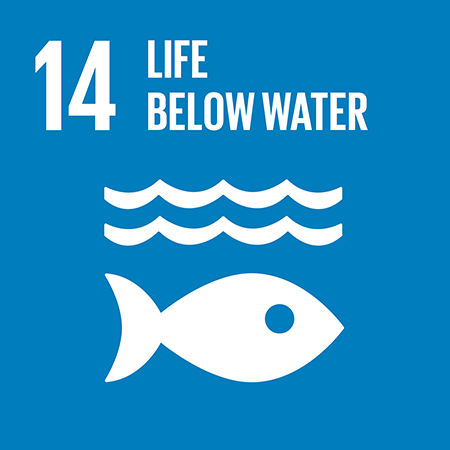
SDG 14: LIFE BELOW WATER
Aims to conserve and maintain the use of ocean, sea and coastal resources for sustainable development. The implementation of activities to achieve the targets in Goal 14, is not only beneficial for sustainable marine ecosystem management, but also has an impact on the achievement of other SDGs Goals, namely Goal 1, Goal 2, Goal 8, Goal 11, Goal 12 and Goal 13 which are the results of the analysis. scientific studies by the International Council of Science (ICSU, 2017)
Some of the targets that have been agreed in Goal 14 are: (i) preventing and reducing marine pollution, especially from land, including marine debris and nutrient pollution; (ii) protect and sustainably manage marine and coastal ecosystems; (iii) minimize and address the impact of increasing acid levels in the sea and (iv) regulate the harvesting of fish at sea and illegal, unreported, and unregulated (IUU) fishing; and (v) conservation of at least 10% of marine and coastal areas according to scientific information; (vi) maintaining subsidies that encourage overcapacity and overfishing and that encourage IUU fishing; (vii) increasing the economic benefits of the sea to communities in small island countries and developing countries by sustainable use of marine resources, including through sustainable fisheries management, aquaculture and tourism.
Supporting aquatic ecosystems through education
- Fresh-water ecosystems (community outreach)
- Sustainable fisheries (community outreach)
- Overfishing (community outreach)
1)Unpad has educational program of marine conservation
Padjadjaran University has a Master in Marine Conservation study program. In the curriculum, there is learning about an environmental impact analysis of marine conservation, marine ecosystem conservation, and research on marine water pollution.
Vision
Becoming a Research-Oriented Superior Masters Program in Marine Conservation and International Competitiveness in the Field of Marine Conservation, in 2024.
Mission
- Organizing quality education in marine conservation.
- Carry out research and produce quality scientific publications at national and international levels in the field of marine conservation, both lecturers and students.
- Organizing quality community service activities based on local wisdom according to community needs and the development of marine conservation.
- Establish strategic cooperative relationships with the community, government, other universities both domestically and abroad, as well as the private sector and industry on anongoing basis.
Future Prospects
- Carry out quality learning in the field of marine conservation to produce graduates who have competence in the field of marine conservation
- Produce graduates who produce independence, integrity and leadership, so that they are able to contribute to the development of sustainable marine conservation.
Master of marine conservation Unpad
2)Ocean Young Guards FPIK Unpad Invites Semai Mangrove Elementary School Students to Mundu Beach
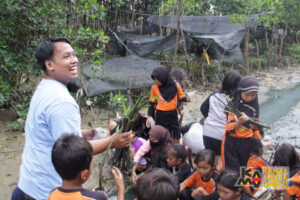
Regency Children’s Forum, held an “Ocean Young Guards” activity in the coastal area of Mundu, Cirebon Regency, 18-19 January 2022. This activity was held to encourage the younger generation, especially in coastal regions with a conservationist character. There are three main agendas for this OYG activity, which are participated in by the students of SDN 3 Mundu Pesisir, namely “Fighting Carbon Footprints (tax)”, “Keeping the Seas Free of Trash (Jalapah), and “My Own Mangrove”. These three agendas contain an introduction and understanding of three marine and coastal ecosystems and their problems, as well as implementing beach cleaning making eco-bricks and mangrove seedlings.
3)Strengthening Institutional Capacity in the Context of Sustainable Use of Clean Water
Padjadjaran University’s Hybrid Integrative KKN−PPM with the theme “Strengthening Institutional Capacity in the Context of Sustainable Use of Clean Water”. This activity was carried out in three locations, namely Genteng Village, Kadakajaya Village, and Hijrah Village.
Strengthening Institutional Capacity in the Context of Sustainable Use of Clean Water
1)Marine tourism study program
Padjadjaran University has a Marine Tourism study program that aims to organize quality community service activities based on conservation and local wisdom, following community needs and developing the world marine tourism industry.
2)Marine tourism festival 2022
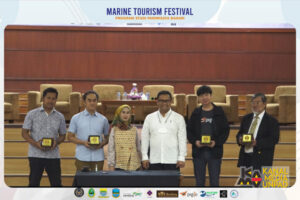
The Maritime Tourism Study Program, Faculty of Fisheries and Marine Sciences, Unpad, held a “Marine Tourism Festival” theme “, Indonesian Coastal Charm Archipelago”, at the Grha Sanusi Hardjadinata Building on December 17 2022. The “Marine Tourism Festival” event was filled with events such as talk shows, signings collaboration, exhibitions, photography competitions, and music performances. The speaker conveyed the marine tourism destination strategy, namely:
- It is necessary to promote marine tourism destinations and marine product packages.
- We are organizing marine tourism events.
- Strategic partnership with online travel agents.
- We are strengthening creative economic products supporting marine tourism.
- Marine tourism product innovation.
- Travel corridor arrangement for marine tourism destinations.
- Adjustments to visa and international travel regulations and readiness for Cleanliness, Health, Safety and Environmental Sustainability/CHSE in marine tourism destination areas.
3)Hybrid Course: Microplastics Sampling and Analysis

The Center for Southeast Asian Studies (CSEAS) collaborated with the Norwegian Institute for Water Research (NIVA) under the ASEAN-Norwegian Cooperation Project on Local Capacity Building for Reducing Plastic Pollution in the ASEAN region (ASEAN), has collaborated as an organizer with Centre for Environment and Sustainability Science (CESS) Universitas Padjadjaran. This Microplastics Sampling and Analysis: Hybrid Course aims to provide capacity-building programs for microplastics experts, strengthen microplastics analysis, enhance experts’ knowledge through training, and prepare a microplastics laboratory.
This course is conducted in the format of a hybrid introduction course followed by a discussion session based on previous experiences from the participants. There will be microplastic experts from the Norwegian Institute for Water Research (NIVA) giving the introduction course and moderating the discussion session. The system is open for scientific personnel, technicians, or PhD students with an interest and some experience in microplastic analysis or who would like to start building this competence.
1)Marine talkin about the impact of overfishing and bycatch
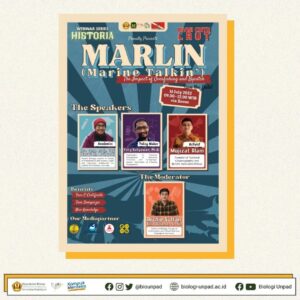
The Unpad biology student association held a webinar, Marlin: Marine, about the impact of overfishing and bycatch. The activity held on Saturday, July 16 2022, presented Dr. rer. nat Tri Dewi K. Pribadi (academic), Fery Sutyawan, PhD (Policy maker), Mujizat alam (Activist), and Archie Sultan Eka Buana as moderator.
Marine talkin about the impact of overfishing and bycatch
2)First lecture about Fish and Fisheries Product: Waste & Utilization for Product Development

The Faculty of Fisheries and Marine Sciences, Padjadjaran University, held an inaugural lecture entitled Fish and Fisheries Product: Waste & Utilization for Product Development, held virtually on Monday, February 14 2022. The speaker said that proper processing will produce valuable products. Through bioconversion reactions or biological methods that separate food components, developing effects from seafood waste.
Stadium General about Fish and Fisheries Product: Waste & Utilization for Product
Supporting aquatic ecosystems through action
- Conservation and sustainable utilisation of the oceans (events)
- Food from aquatic ecosystems (policies)
- Maintain ecosystems and their biodiversity (direct work)
- Technologies towards aquatic ecosystem damage prevention (direct work)
1)Exhibition of fisheries and marine innovation products
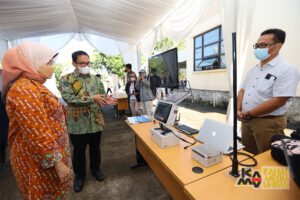
The Faculty of Fisheries and Marine Sciences, Padjadjaran University, held an exhibition of fisheries and marine innovation products at the peak of its 17th Anniversary in the courtyard of the Dean’s Building, FPIK campus, Jatinangor on Thursday, 7 July 2022. At this event, Unpad received cold storage assistance and cafeteria facilities were built and entitled “Fish Cafe” to market various processed fish products resulting from downstream research and MSMEs assisted by FPIK.
Exhibition of fisheries and marine innovation products
2)International webinar “Professor Discovery to Protect Our Ocean”
The Department of Marine Affairs, Faculty of Fisheries and Marine Sciences (FPIK) Padjadjaran University held an international webinar, “Professor Discovery to Protect Our Ocean (Padoc) on Wednesday 9 November 2022. This activity was attended by more than 300 participants: students, researchers, practitioners, lecturers and high school students. The theme is ‘The Future of Conversation and Sustainable Exploitation of Aquatic and Marine Resources”. The mission of this activity is to campaign for unhealthy seas and marine biota, find solutions to save the ocean and contribute to the development of science and technology, which aims to protect the future of the sea through education and research.
International webinar “Professor Discovery to Protect Our Ocean
3)International Summer Program: The Global Strategy of Blue Economy: Challenge, Potential, and Development.
FPIK Unpad is holding the 2022 International Summer Program, which will be held on 12-18 September 2022 with the theme The Global Strategy of Blue Economy: Challenge, Potential, and Development. There are several topics, such as Fisheries, Coastal and Marine Tourism, Maritime Transport, Renewable marine (off-shore) energy, Aquaculture, Seabed Extractive activities, marine biotechnology and bioprospecting. This activity is open to national and international participants with a course method in the form of a massive available online course.
1)Policy of canteen management
The principles of canteen management are as follows:
- Maintaining the quality of food and beverage products served in the canteen, as well as providing friendly and efficient service to customers;
- Providing a variety of menu options for a variety of tastes, special dietary needs, and food preferences;
- Complying with applicable food safety standards, including storing, processing, and managing food safely to prevent contamination and disease;
- Providing quality raw materials by ensuring a consistent supply and selecting sustainable raw materials.
Regulation of canteen management
2)Product from Fisheries Faculty “Masterfish”
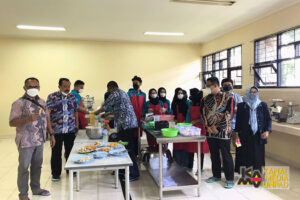
Faculty Student Activity Unit Fisheries Product Processing Technology Forum and Science Studies (Fortification) Unpad Faculty of Fisheries and Marine Sciences provides processed frozen fish products under the brand “masterfish”. Masterfish has a variety of processed fish products, such as dragon feet, siomai, squid meatballs, otak-otak, tuna meatballs, and fish rolls.
Product from Fisheries Faculty “Masterfish”
3)Halal canteen
To guarantee quality food for students and the academic community, Unpad developed a halal and Tayib (Thayib) campus canteen. This canteen is located at GOR Santika, Jatinangor Campus, which is the main campus of Unpad. The soft launching of this canteen was held on October 4 2022, in collaboration between the Padjadjaran Halal Center and Bank Indonesia. As many as 34 canteen business actors were also involved in training on how to produce good food, such as choosing halal product raw materials, using supporting equipment, and creating processes that comply with halal standards. This canteen is open to all Unpad residents and operates from 08.00 to 18.00.
1)Planting the tree seedlings in the “Leuwi Padjadjaran 2” reservoir
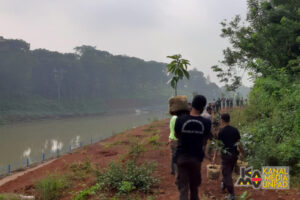
Padjadjaran University, together with the Indonesian Palawa Foundation, planted tree seedlings in the “Leuwi Padjadjaran 2” reservoir area, Unpad campus, Jatinangor, on Tuesday, 1 February 2022. This tree planting activity continues the 1,000 trees in 4 years program for Unpad. At this event, 154 tree seedlings were successfully planted by a team from the Student and Lecturer Association of the Faculty of Agricultural Industrial Technology, BEM Kema, UKM Palawa alum representatives, the Palawa Indonesia Foundation, and several security personnel on campus. The location around Leuwi Padjadjaran was chosen to revegetate the area.
Planting the tree seedlings in the “Leuwi Padjadjaran 2” reservoir
2)Coastal clean up in Pangandaran

Padjadjaran University Real Work Lecture (KKN) students for the July-August 2022 period in Cijulang Village, Pangandaran Regency, held a Coastal Clean Up (CCU) action and planted 400 mangrove seedlings in Cijulang Village. This coastal environmental cleanup activity aims to instil understanding and increase love for the environment to create a healthy life for oneself and the earth. Students from SDN 4 Cijulang attended this action.
Coastal clean up in Pangandaran
3)Think Green 7.0 “Blue Carbon Project”
To help restore the blue ecosystem, the Social and Environmental Department of BEM Kema, Faculty of Fisheries and Marine Sciences, Padjadjaran University held a social action entitled “Think Green 7.0 on 3, 7 and 19 December 2022. This activity is an implementation of the “Blue Carbon Project” program in the form of planting mangroves and innovation in the form of coral reef transplantation. This social action was carried out in Pangandaran and Pramuka Island, Seribu Islands, in collaboration with student organizations at FPIK Unpad, such as Malacca, Parimata, Oceanik, as well as the Fisheries Student Association and the Maritime Tourism Association. In this activity, the team succeeded in planting around 1000 mangrove seedlings in the Pangandaran coastal area on Saturday, 3 December 2022. Meanwhile, another program, namely the transplantation of 40 coral reefs, was carried out in Pramuka Island, Seribu Islands, 7-9 December 2022.
1)Noabox, Pioneering ocean monitoring device
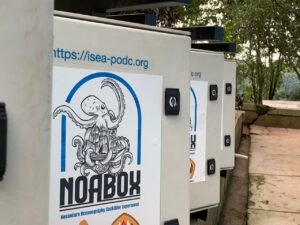
Monitoring ocean conditions is of utmost importance and has recently emerged as a significant concern in the global scientific community. Indonesia, being an archipelagic nation situated along the equator, boasts intricate and distinctive sea characteristics shaped by factors like monsoon patterns, bathymetry, and the complex interplay between the Indian Ocean and the Pacific Ocean.
Consequently, the NOABOX Instrument, a pioneering monitoring device, has been developed by integrating IoT (Internet of Things) technology and the low-cost instrumentation concept. This innovative instrument is designed to provide a cost-effective solution, offering a budget-friendly alternative for precise measurements. The primary objectives of this project include:
- Creating a compact, easily deployable instrument for various ships.
- Minimizing costs.
- Ensuring high precision.
- Requiring minimal human resources for operation.
The prototype has a compact, portable design, serving as a versatile survey platform capable of delivering high-quality data for marine operations. To meet these requirements, the plan focuses on reducing the vessel’s size to allow for mobilization and deployment by just one or two personnel, cost-effectiveness, and efficient battery capacity with a five-year mission duration.
Noabox, Pioneering ocean monitoring device
2)Transgenesis method for increasing Catfish production
The Faculty of Fisheries and Marine Sciences, Padjadjaran University, said technological engineering for catfish production through transgenesis will result in faster growth improvements than non-transgenic fish. Transgenic fish can benefit fish farming. Through the application of transgenesis technology, it will improve the growth performance of pearl catfish.
Transgenesis method for increasing Catfish production
3)Bioremediation process to improve the quality of shrimp
A team of students from the PSDKU Fisheries Study Program at Padjadjaran University in Pangandaran made efforts to improve the quality of shrimp cultivation wastewater through the bioremediation process, which is a biological process that uses microorganisms to break down waste in cultivation ponds into non-toxic compounds. The research results show that this bioremediation technique can reduce the pollutant load of shrimp farming wastewater, namely biochemical oxygen demand (BOD), by up to 37.73% and ammonia by up to 100%.
Water sensitive waste disposal
- Water discharge guidelines and standards
- Aquatic plan to reducing plastic waste
- Reducing marine pollution (policy)
1)Management of eco-friendly campus
Padjadjaran University has a Chancellor’s Regulation regarding eco-friendly campus management, one of the concerns of which is water conservation. Water use includes planning, controlling and using groundwater resources with technological management and behavioural changes to ensure water availability in the future.
Management of eco-friendly campus
2)Water discharge scheme
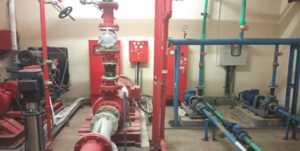
UNPAD uses 3 water sources for its consumption needs, the three sources are PDAM, deep wells, and springs. UNPAD also utilizes water reservoirs to temporarily store water, which will flow directly to each building in UNPAD. Some notable buildings use water directly from deep wells and local water reservoirs. The collected water is used for laboratories, restrooms, rectorate office, lecture hall and Jalatista.
In general, Unpad has 16 wells spread at 16 points around the Unpad Jatinangor campus area. The sixteen wells are divided into 2 pump wells and 14 drilled wells. In the consumption of processed water, Unpad has its own Standard of Procedure. Effluent of gray water and black water treatment through IPAL is a control pond (biological treatment) and then flowed into Check dam and Unpad Basin. Check dam and Unpad Basin water has been widely utilized in the Unpad Jatinangor area, some of which are garden watering, watering experimental gardens, irrigation of residents’ rice fields, and water sources for fire trucks.
2)Water reuse and recycling scheme at Unpad
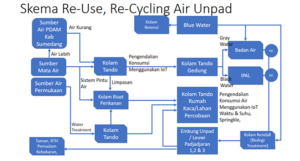
Padjadjaran University has a water reuse and recycling scheme, using nano bubbles and a runoff water harvesting system for fisheries.
1)Prohibition of the use of single-use-plastics
(1) Each work unit is responsible for supporting, maintaining, monitoring, and coordinating to realize the active participation of Unpad people in implementing the prohibition of single-use plastics.
(2) Each work unit is obliged to facilitate the implementation of the prohibition of single-use plastics at Unpad.
(3) Each of Unpad people is obliged to comply with the prohibition of the use of
single-use plastics at Unpad.
(4) Each Unpad guest is directed and notified to be able to support the implementation of the prohibition of the use of single-use plastics when visiting Unpad.
Rule of Rector Number 10 Of 2022 concerning Prohibition of the use of single-use-plastics
2)Management of Eco-Friendly Campus
The university has an action plan in place to reduce plastic waste on campus. One of the foundations of the Eco-Friendly Campus at Unpad is the Prohibition and reduction of the use of single-use plastics in the form of drinking water packaging made of single-use plastics, single-use plastic bags, plastic-based food wrappers, plastic-based eating and drinking utensils and backdrops, and plastic-based banners in the context of the principles of reduce, reuse, recycle, and reject
Management of Eco-Friendly Campus Of Universitas Padjadjaran
1)Policy of marine pollution
In order to realize Unpad as a university that implements the principles of management and utilization of the water environment, the entire Unpad Society of Academicans is required to take an active role in the established three pillars of higher education (tridharma perguruan tinggi) programs related to the management and sustainable utilization of the water environment.
(1) Every person responsible for activities that can cause water pollution at Unpad is obliged to prevent water pollution from occurring.
(2) Every person responsible for activities at Unpad that dispose of waste into waters is obliged to fulfill the requirements regarding liquid waste water quality standards, emission quality standards, and other provisions in accordance with applicable laws and regulations.
(3) Liquid waste and/or solid waste from routine operational activities at Unpad must be managed and disposed of in liquid waste and/or solid waste management facilities in accordance with applicable regulations.
2)Water pollution control in Campus
One of the applications of the Internet of Things at Unpad is controlling the level of septic tank fullness around the campus area. This innovation will signal if the septic tank has reached a certain level of fullness. By getting the latest information, the management and maintenance of septic tanks will be better and not pollute the environment. Unpad conducts water quality monitoring at 9 points on the Unpad Jatinangor campus annually. Water parameters examined are biological, chemical, and physical parameters in total. In addition to being carried out at the outlet points of the wastewater management plant (IPAL) on the Unpad Jatinangor campus, water quality monitoring is also carried out at the Check dam, Unpad Basin, and Sekebitung spring outlet. The water quality measurements at each IPAL show numbers below the predetermined quality standards. In other words, the processed water is safe to be discharged into water bodies.
Water pollution control in Campus
3)Waste Water Management Installation
Every faculty has sewage disposal at Universitas Padjadjaran; we called it “Instalasi Pengelolaan Air Limbah (IPAL)”. Liquid waste from academic activities such as research and mini-research will be delivered to IPAL. In addition, the liquid waste we had is not hazardous and toxic, only non-toxic liquid waste. The quality of the liquid waste in IPAL will be monitored by testing several parameters, one being pH. If the pH follows the environment pH, it will be removed from the IPAL. This IPAL is to prevent water pollution and as a commitment of Unpad that the water released from IPAL is worth using.
Maintaining a local ecosystem
- Minimizing alteration of aquatic ecosystems (plan)
- Monitoring the health of aquatic ecosystems
- Programs towards good aquatic stewardship practices
- Collaboration for shared aquatic ecosystems
- Watershed management strategy
1)Standard Operational Procedure (S.O.P) for handling hazardous toxic waste
Unpad has a Standard Operational Procedure (S.O.P) for handling hazardous toxic waste. For example, sorting by separating and storing waste based on group type and character. In terms of storage, hazardous waste is stored for a maximum of 90 days for category A and 360 days for category B waste, while for infectious, pathological and sharps medical waste a maximum of 2×24 hours at a temperature > 0 degrees Celsius and 90 days at a temperature < 0 degrees Celsius.
Standard Operational Procedure (S.O.P) for handling hazardous toxic waste
2)Management of Eco-Friendly at Universitas Padjadjaran
University has a plan to minimise physical, chemical and biological alterations of related aquatic ecosystems. The Management of the Eco-Friendly Campus Program of Unpad refers to the following Green Campus benchmarks Security, Safety, Health, and Comfort at Work
a.Air circulation;
b.Ambien air quality;
c.Arrangement of non-smoking area;
d.Monitoring and greenhouse effect, especially CO2 and CO;
e.Chemical and natural pollutants;
f.Biological pollutants;
g.Physical comfort;
h.Noise measurement;
i.Adequacy of work spaces;
j.Room lighting quality;
k.Use of personal protective equipment when working with high risks;
l.Sanitation system
Water Conservation
a.Water management policy;
b.Regulation and control of water usage;
c.Efficiency of clean/fresh water usage;
d.Efficiency of water distribution with faucets;
e.Water quality;
f.Water treatment, recycling, and storage;
g.Water filtration;
h.Reduction in the manufacture/use of deep wells;
i.Zero runoff and infiltration wells;
j.Conservation and reforestation of water catchment areas;
k.Conservation and maintenance of water sources
Management of Eco-Friendly at Universitas Padjadjaran
2)Workshop of laboratory waste and toxic hazardous waste at Unpad
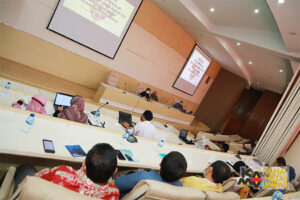
Laboratory waste and toxic, hazardous waste (B3) need to be appropriately managed. Therefore, Padjadjaran University, through the Unpad K3L Center, is holding a dangerous waste management workshop in the Unpad Environment, which will be held on August 25 2022 at Bale Rucita, Unpad Rectorate Building. This activity was attended by laboratory managers, especially waste management personnel. The workshop was attended by 50 participants from representatives of faculties and work units within Unpad.
Workshop of laboratory waste and toxic hazardous waste at Unpad
1)Bioremediation technique to reduce the pollutant load of shrimp farming wastewater

A team of students from the PSDKU Fisheries Study Program at Padjadjaran University in Pangandaran made efforts to improve the quality of shrimp cultivation wastewater through the bioremediation process, which is a biological process that uses microorganisms to break down waste in cultivation ponds into non-toxic compounds. The research results show that this bioremediation technique can reduce the pollutant load of shrimp farming wastewater, namely biochemical oxygen demand (BOD), by up to 37.73% and ammonia by up to 100%.
Bioremediation technique to reduce the pollutant load of shrimp farming wastewater
2)Mapping of potential waste produced by fishery product

The PSDKU Fisheries Study Program Lecturer Team at Padjadjaran University in Pangandaran conducted a mapping of potential waste produced by fishery product processors in four sub-districts in Pangandaran Regency. Research was undertaken to map how much fisheries waste is paid each month and its types. The research results show that the highest production of fishery waste is in the Pangandaran District, reaching more than 30 kilograms per month, with the most common type of waste being fish offal.
Mapping of potential waste produced by fishery product
3)Monitoring waste water treatment plant at Unpad
Every faculty has sewage disposal at Universitas Padjadjaran; we called it “Instalasi Pengelolaan Air Limbah (IPAL)”. Liquid waste from academic activities such as research and mini-research will be delivered to IPAL. In addition, the liquid waste we had is not hazardous and toxic, only non-toxic liquid waste. The quality of the liquid waste in IPAL will be monitored by testing several parameters, one being pH. If the pH follows the environment pH, it will be removed from the IPAL. This activity is to prevent water pollution and as a commitment of Unpad that the water released from IPAL is worth using.
Monitoring waste water treatment plant at Unpad
4)Water pollution control in campus area
Unpad conducts water quality monitoring at 9 points on the Unpad Jatinangor campus periodically every year. Water parameters examined are biological, chemical, and physical parameters in full. In addition to being carried out at the outlet points of the wastewater management plant (IPAL) on the Unpad Jatinangor campus, water quality monitoring is also carried out at the Check dam, Unpad Basin, and Sekebitung spring outlet. The results of water quality measurements at each IPAL show numbers below the predetermined quality standards, in other words, the processed water has a safe quality to be discharged into water bodies.
Water pollution control in campus area
1)Unpad build Floating net cages for fisherman in Pangandaran

Padjadjaran University, through the Faculty of Fisheries and Marine Sciences, is developing floating net cages (KJA) on the East Coast of Pangandaran. This facility is not only for cultivation activities but also a medium for learning and developing educational tourism in Pangandaran. Three fisheries commodities are being produced, namely lobster, grouper and pomfret, which are superior commodities in Indonesian waters.
Unpad build Floating net cages for fisherman in Pangandaran
2)The guideline of Collaborative research priority on blue economy
There is Indonesian collaborative research in 2022. The research focus can include priority areas of science, technology and social humanities following the direction of the Ministry of Education, Culture, Research and Technology and the National Research and Innovation Agency. This focus includes research fields in the food, energy, health independence, transportation, defence and security, agro-maritime, tourism, digital diplomacy and social humanities sectors. In the future, the results of this research can provide sustainable development that relies on the digital, blue and green economy.
Collaborative research priority on blue economy
3)One of the theme focus in HIPSMU competition is Blue economy
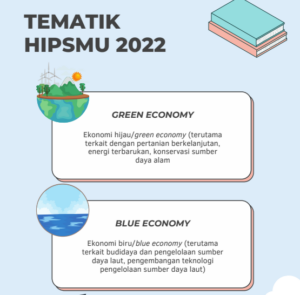
The 2022 HIPSMU program is the third time this activity has been carried out. During the previous two periods, HIPSMU has captured various ideas and innovations produced by young talents at the University. In 2022, HIPSMU will again provide opportunities for Unpad students to realize innovative business ideas. The focus of HIPSMU 2022 has five exciting themes to explore, namely green economy, blue economy, digital economy, health independence and tourism development.
One of the theme focus in HIPSMU competition is Blue economy
1)The Citarum Research Center, Unpad collaborates with Monash University, Australia and the University of Indonesia for Citarum river transformation
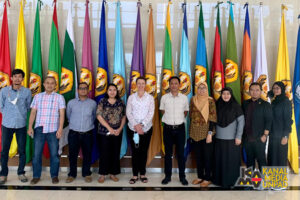
The Citarum Research Center collaborates with Monash University, Australia and the University of Indonesia in the research “Citarum River Transformation: A Living Lab for International Research and Impact”. Unpad studied the “Regional Biophysical Assessment of Surface and Ground Water” in the Citarik River, an ecotourism area. It is hoped that this research will transform spaces around rivers into areas that are environmentally friendly and have a sustainable economic concept with businesses that the community can run.
Citarum river transformation: A Living Lab for International Research and Impact
2)Coral Reef Transplantation with National Geographic Indonesia
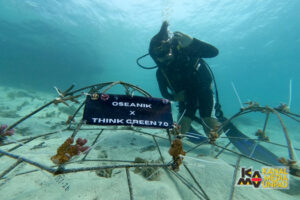
To help restore the blue ecosystem, the Social and Environmental Department of BEM Kema, Faculty of Fisheries and Marine Sciences, Padjadjaran University held a social action entitled “Think Green 7.0” on 3, 7 and 9 December 2022. This activity implements the “Blue Carbon Project” program through mangrove planting and innovation in the form of coral reef transplantation. This social action occurred in the Pangandaran and Pramuka Islands and Seribu Islands. Furthermore, collaboration is also carried out with various partners, such as Aruna Indonesia, Fishlog, National Geographic Indonesia, the Ministry of Maritime Affairs and Fisheries, the Indonesian Aquarium, and the West Java Province Environmental Service.
2)Marine research collaboration between the National Research and Innovation Agency (BRIN)

PPadjadjaran University is part of a marine research collaboration between the National Research and Innovation Agency (BRIN), universities and industry through the Marine Biomaterials Research Collaboration Center (PKRBK). This collaboration was marked by a focus group discussion (FGD) on 30-31 May 2022. This collaboration will ensure that the potential of existing biomaterials related to chitosan from crab waste, gelatin from fish skin waste, and carrageenan from seaweed can become innovative packaging products (Eco labelling). ), anti-ageing cosmetics, and bioplastics, which will be enjoyed by society and can be part of the solution to overcome environmental problems.
Marine research collaboration between the National Research and Innovation Agency (BRIN)
1)Watershed management strategy at Unpad

Based on the drainage conditions in the UNPAD Micro watershed area, a water conservation program is prepared to be implemented gradually. Conservation efforts that have been conducted to prevent the surface runoff flow are constructing a basin, checking dams, retention ponds, infiltration wells, bio drainage areas, rain gardens, rainwater harvesting, and bio pores. In general, the Jatinangor Unpad area has a significant difference in altitude, so it has a slope and has the potential to become a water catchment area. Unpad Campus has regional conditions such as ridges and valleys to become a catchment for rainwater that falls to the surface.
Watershed management strategy at Unpad
2)Water managment strategy
The usage of recycled water at the Unpad Jatinangor Campus includes four activities that have been carried out, which are (1) Utilization of Unpad Basin for irrigation of rice fields and experimental gardens around the campus area; (2) Nano bubble technology to recyle water; (3) Utilization of Water from Arboretum UNPAD Check Dam for Irrigating Gardens and Experimental Gardens; and (4) Jalatista UNPAD. Below is watershed management strategy in Unpad.
The Use of Water Efficient Appliances Water tap toilet flush etc
